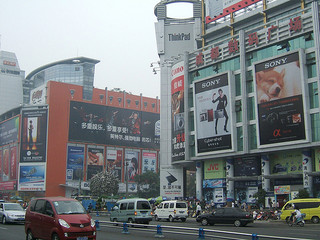By A. Nichols
In the 1900’s, the USSR’s GDP was higher than that of China. Today, however, it is China’s GDP which is higher. The swap was due to a multitude of reasons including better reform decisions and work culture in China than in the USSR. Furthermore, the USSR used prisoners of war as mass laborers, who did shabby work because they resented it. China’s mass laborers (who were Chinese), on the other hand, felt obliged to work for their motherland, and thus did better work.
Photo of Sputnik, the first satellite in space. By Cliff1066
The Soviet Union spent a huge proportion of its GDP on the military, reducing funding to other sectors of the economy. This reduced economic growth. China comparatively spent a small proportion of its GDP on its military. China, therefore, had enough left to spend on other economic activities, thus burgeoning economic growth. In the 1970’s, China allowed some level of capitalism in its economy and individuals set up companies, thereby expanding growth. The USSR didn’t allow any individual to establish a company, and so did not get the benefit that comes from an increase in companies: higher revenue. Also, the abundance of cheap labor in China attracted foreign investment, further expanding job creation and growth. Russia at that time lacked, and still lacks, abundant cheap labor. This discouraged foreign investment, leaving investment largely to the sole local investor, the state.
When both countries reformed in the 1980’s, China opened up to general ideas from the West about economic reform, and these copious ideas led to a greater understanding of how the economy works. China then used these to properly rearrange its economy in a way that has now made the country prosperous.
Chengdu, China. Photo by jdklub.
Russia, on the other hand, believing that the West had nothing to teach them, utterly rejected reform ideas from the West, thus, limiting the reform options that the Soviets could have had. This led to poor reform decisions, which consequently led to the collapse of the Soviet Union. The Soviet Union also dismissed globalization, equating it to Americanization. This meant that Russia did not get the benefit of trade, more income. China, on the other hand, opened up to globalization, exporting numerous goods, and is now enjoying a high rate of growth due to the exports.
A human rights protest. Photo by hunxue-er.
However, China might collapse just like the Soviet Union did. Many Chinese citizens now resent their government for its repression, brutality, and high corruption. If these vices of the government accelerate, people could revolt. A specific example would be the repression of the Tibetans, and the Uyghurs in Xinjiang province. Just like the Soviet republics of Georgia and Ukraine started to demand secession from the Union, residents of Tibet and Xinjiang are also demanding secession from China. Simply put, despite China having achieved more than the Soviet Union, it could end up disintegrating just like it.


